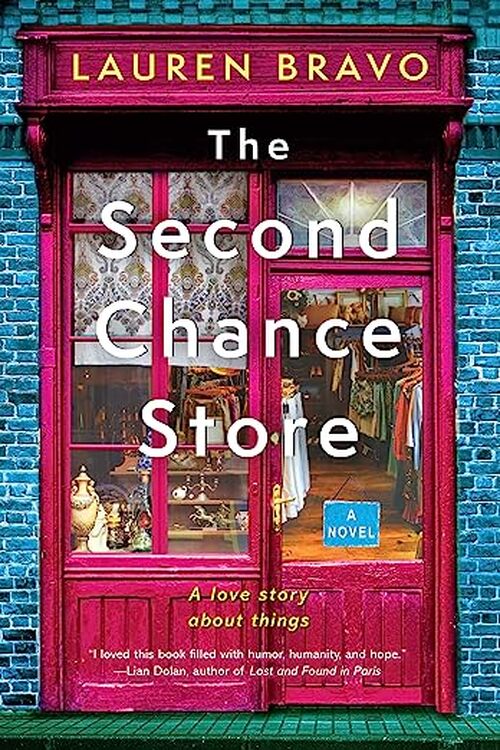THE SECOND CHANCE STORE: Pg # 17-20
To the ignorant, all charity shops are the same.
The particular smell of softening biscuits, yellowing paperbacks and aged storage heaters turned up slightly too high. The distant sound of Steve Wright in the Afternoon crackling through a portable stereo. The racks, a little too close together for comfortable browsing, laden with items at once both too old and too new to be fashionable. A bookshelf of indeterminate filing system that will reliably contain several copies of Shantaram, The Dukan Diet, and Bridget Jones’s Diary. A glimpse through an open door into a stockroom beyond, filled with bin bags, half- drunk cups of tea, and the theatrical hiss of a steaming machine.
And behind the counter, a kindly soul whose job is to scrutinize you. A generous person who has given up their time for the benefit of those less fortunate, who will probably rifle through your donations after you’ve gone and laugh at how gross they all are. An angel on earth, who will nonetheless hold up your ill- judged holiday shorts from 2009 while shrieking, “Cor, Brenda, get a load of these!”
And they’re allowed to, because after all, what have you sacrificed to help others recently? The shorts? Is that it?
To the uninitiated, all charity shops have the same air. A potent blend of the depressive, the nostalgic, and the worthy. The lingering essence of a grandparent, distilled into boxes of clumsy bric- a- brac. The unbearable sadness of unwanted gifts, never taken out of their plastic packaging. A childhood memory too far gone for conscious recollection, which now exists only as an occasional twang in the pit of the stomach, triggered by a waft of a certain perfume or the feel of bobbled cotton between two fingertips.
And death. The thing that squats like a fat elephant in the corner of every charity shop in the land. The reason half this stuff is here, and often the reason it’s being sold. Dead people’s clothes, in aid of dead people diseases, sold by people closer to death than you are. It’s a lot to take on for a cheap T-shirt.
But the truth is, there are as many flavors of charity shop as there are charities to run them. There are posh charity shops and hip charity shops and hippie charity shops and minimalist charity shops and obsessively neat charity “boutiques” and muddled, must- addled junk emporiums. There are charity shops for every neighborhood, for every purpose, metabolizing all that waste and using it to generate a new kind of energy. Each shop becomes different each day, as more new- old bundles are unpacked into its belly. Continually reconfiguring to reflect the world around it. Or, the world that was around it five to ten years earlier.
And if you can learn a lot about people from peering into their trolleys at the supermarket, you can learn even more from the things they give away. They’re a telling inventory of hobbies that never caught on and relationships that never bedded in. Every castoff has a story, from “For sale: baby shoes, never worn” to “For sale: Nutribullet, never opened.” It’s a story that’s only half- written at point of sale; off to live another life and inspire another volume with some new owner.
“Second chance saloons,” Michael liked to call them, in reference to himself as much as the stock. It’s ironic, he thought privately, that the people who are squeamish about buying secondhand are often the same people who like to pretend everything was better in the past.
The volunteers referred to him as “St. Michael,” named more for his ability to identify a piece of old Marks and Spencer at twenty paces than for his heavenly customer service. In fact, in the grand tradition of the virtuous, he often came across as a raving misanthrope. St. Michael was fine with this. He had learned the hard way in life that there’s usually more to be gained from watching people than there is from charming them.
“Charity shops make people uncomfortable because they do so much good,” Michael was fond of saying at parties, at bars, or to people he met in queues. “They raise money, they reduce waste, they help poor people, they help mad people [here, he would gesture to his own face and wait for a small laugh], they give rich people a place to offload their crap and feel better about it. But all the ways they’re good just serve to remind people of all the ways they, personally, are shitty. That’s why people turn their noses up. Nothing to do with the smell.”
He would leave a pause here, but not such a long one that people would think he had finished speaking and move on.
“Personally, I lean into it,” he would add, with a conspiratorial smirk. “It started as therapy for me, but now I’m the therapist. The counter is my couch. And honey [here, he would affect an American accent with Joan Rivers- esque hand gestures], let me tell you— sometimes everybody needs charity.”
If anyone asked for examples, which they rarely did, he would tell them. About the stories he filled in between the gaps, the way he did with the Evening Standard crossword. About the elderly widower, handing over faded floral blouses from the drawer he finds another man’s letters in. Or the woman who needs clothes to wear to the interview she needs for the job she needs to earn the money she needs to come back to buy the clothes her children need. The millennials who buy vintage to offset the guilt of their coke habit. The boomers who donate cashmere to offset the guilt of voting Leave.
The teenager patching together a new identity from pieces of other people’s wardrobes. The couple who buy latex and masks “for Halloween” in April. The millionaire who can’t make peace with spending more than £4 on a shirt. Or the woman who walks in one afternoon with a bin bag, and hands over an engagement ring.
If charity shops remind you of death then that’s only because they’re so full of life.
Excerpted from THE SECOND CHANCE STORE @ 2023 by Lauren Bravo used with permission by Avon.
THE SECOND CHANCE STORE by Lauren Bravo
A Novel
If clothes can get a second chance, why can’t we? Brimming with life, love, and the stories bound up in even the most everyday items, The Second Chance Store is a tale of friendship, loss, and dusting yourself off and starting over—a novel filled with humor and a testament to the enduring power and joy of charity shops.
City dweller Gwen feels like she’s living a secondhand life. She’s thirty-eight, perpetually single, and in dire need of a dentist’s appointment. Her friends are busy procreating in the country, and conversations with her parents seem to revolve entirely around hedge borders and the trash pickup schedule. Above all she’s lonely. But then, isn’t everyone?
Then she’s let go from a job she drifted into a decade ago and never left, and Gwen realizes it’s time to make a change, starting with cleaning out her apartment. In the charity shop where she literally and metaphorically unloads her baggage, she discovers a group of weird and wonderful people devoted to finding a new home for donated items that have lost their use elsewhere. Gwen volunteers there—and finds a new home for herself among her fellow workers while discovering joy in the untold stories of secondhand things.
Now it’s time for Gwen to get out of her life in pause, and to find a way to move forward with bravery and humanity—and more regular dental care.
Humor [Avon, On Sale: July 4, 2023, Paperback / e-Book, ISBN: 9780063277786 / eISBN: 9780063277793]
 New home and hope for the forgotten
New home and hope for the forgotten
Buy THE SECOND CHANCE STORE: Amazon.com | Kindle | BN.com | Apple Books | Kobo | Google Play | Powell’s Books | Books-A-Million | Indie BookShops | Ripped Bodice | Love’s Sweet Arrow | Walmart.com | Target.com | Amazon CA | Amazon UK | Amazon DE | Amazon FR
About Lauren Bravo
I’m an author and award-winning journalist, writing about fashion, food, pop culture, travel, feminism and life, for people like Sunday Times Style, Grazia, Refinery29 UK, Cosmopolitan, Stylist, easyJet Traveller, Foodism, Delicious, The Telegraph and The Guardian.
My debut novel Preloved was published by Simon & Schuster in April 2023, and (as The Second Chance Store) in the US by William Morrow on July 4th 2023. My first book, What Would The Spice Girls Do? was published by Transworld in 2018, followed by How To Break Up With Fast Fashion, published by Headline in 2020. In 2021 I also contributed to This Is How We Come Back Stronger: Feminist Writers On Turning Crisis Into Change. I pop up semi-regularly on podcasts and radio, and very occasionally on the telly.
I’ve also worked extensively as a commercial copywriter, for the likes of Sainsbury’s, River Cottage, The Flour Station, British Gas, Betty.me, RED Valentino, BBC, Channel 4, BLOWOUT Ibiza, O2 Magazine and Tesco, on web copy, social media content and digital strategy.
From the age of 14 I was a weekly columnist for The Worthing Herald, which they were kind/daft enough to let me carry on doing for 11 years. For nostalgia’s sake you can find lots of those columns archived here too.




No Comments
Comments are closed.